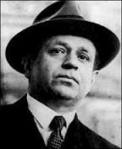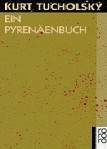We had Red Gierke for geography. He had a lot of little blood vessels in his face, which gave him a coppery red appearance. To justify his nickname, he had had the decency to grow a red beard. He didn’t like us, and we didn’t like him. He had the reputation of being deceitful and vengeful. The judgements of school classes are always correct, so it will have been true.
Monthly Archives: July 2013
Tucholsky Pyrenees Book
Peter Panter‘s Pyrenees Book (Peter Panters Pyrenäenbuch)
There is a section of Romantic philology concerned with French, and those responsible for it are serious men whose main occupation is to prove how German their chosen subject actually is. There are German Baedeker Parisians who feel themselves to be cosmopolitan as they leave a salon de beauté, and regard their familiar wife at home as a freak of nature. And there are… But let’s leave it at that; describing how Germans react towards France quickly becomes a history of the German soul.
The Erfurt Sentence (Das Erfurter Urteil)
Fedja: You who are paid a few coins each month for your disgrace now put on your uniform and lord it over those whose little finger is worth more than the whole of you, and who wouldn’t have anything to do with you. You are now in charge, and you are making the best of it.
Judge: Take him down.
(Tolstoy: The Living Dead)
Ossietzky Reflection Reader
The Crooked Hat (Der schiefe Hut)
Once up on a time – it was during the holidays, and it wasn’t all that long ago – I was staying in a boarding house near Lucerne, looking at the grey lake. The weather was dull, and I thought, „That horse race down there won’t be much fun either.“ Maybe it wasn’t a horse race at all, it may have been show jumping. I don’t understand much about such things. If you had seen me ride a horse, you would understand what pacifism is. I know where the horse’s head is, at the front, but that’s all I know, so I will never write one of those fine social novels in which the lower orders forget, and are supposed to forget, their place. Class war? Just hang a hired evening dress below stairs, they’ll soon forget about class war. Anyway, as I was saying, Lucerne.
Pfemfert
Karl Kraus
To whom in Prussian Germany did this name mean anything five or three years ago? A small circle of young men of letters valued the bearer of this name as the spirited and brilliant editor of the Viennese journal Die Fackel, and delighted in the brilliant firework of satirical commentaries which exploded violently three times a month in it. But Karl Kraus was no more than a wit to them.
Sahl Essays and Criticism
Hitler, or Exposing an Era (Hitler oder die Demaskierung einer Epoche)
This text was written in 1943 in New York. My friend, the theologian Paul Tillich, gave it to Mrs. Roosevelt, the wife of the American president, whom he occasionally visited, as a contribution to the vigorous debate at the time about “What to do with Germany after the war?” Hans Sahl








